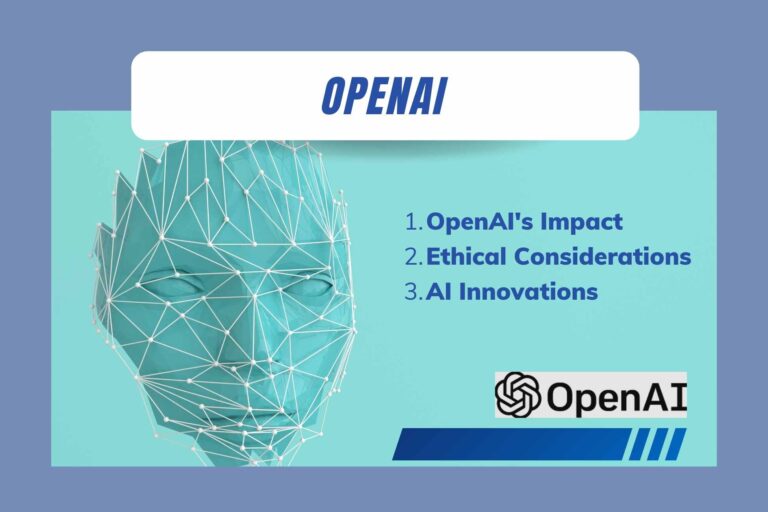Artificial Intelligence (AI) has revolutionized our interactions with technology and opened new doors for innovation. In this article, we will explore the remarkable journey of OpenAI and its pivotal role in shaping the era of artificial intelligence. From its founding principles to groundbreaking achievements, This AI platform has been at the forefront of AI research, driving advancements that have captured the attention of experts and enthusiasts alike.
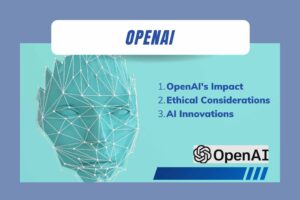
Understanding Artificial Intelligence
Artificial intelligence is a vast field; you must understand it sufficiently to better understand its applications.
Defining Artificial Intelligence and its Applications
Artificial Intelligence, or AI, refers to developing intelligent systems that can perform tasks requiring human-like intelligence. These systems can learn, reason, and make decisions, leading to numerous applications across various industries. From healthcare to finance, AI is transforming how we live and work.
Exploring Machine Learning and Neural Networks
At the core of AI lies machine learning, a branch of AI that focuses on enabling systems to learn from data and improve over time. Neural networks, inspired by the structure of the human brain, are an integral part of machine learning algorithms. They enable machines to recognize patterns, make predictions, and accurately perform complex tasks.
DALL·E 2 – Ignite Your Creativity with AI Image GenerationUnveiling the Power of Deep Learning
Deep learning, a subset of machine learning, has emerged as a powerful technique in AI. It involves training neural networks with multiple layers to extract high-level representations from vast data. Deep learning has proven instrumental in image recognition, natural language processing, and autonomous driving tasks.
Enhancing Language Understanding with Natural Language Processing
Natural Language Processing (NLP) focuses on enabling machines to understand and process human language. It is crucial in various applications, including voice assistants, chatbots, and language translation. NLP algorithms analyze text data, extract meaningful information, and generate relevant responses, enhancing human-computer interactions.
The Journey of OpenAI
The AI company has been taking necessary steps to facilitate the users related to the AI applications as much as possible.
Origins and Founding Principles
OpenAI was founded in 2015 with a vision to ensure that artificial general intelligence benefits all of humanity. Its founders, Ilya Sutskever, Greg Brockman, Trevor Blackwell, Vicki Cheung, Andrej Karpathy, Durk Kingma, Jessica Livingston, John Schulman, Pamela Vagata, and Wojciech Zaremba (with Sam Altman and Elon Musk serving as the initial board members,) recognized the potential risks associated with AI development and aimed to foster a cooperative and transparent approach to AI research.
Evolution of OpenAI’s Vision and Mission
Since its inception, this AI company’s vision has evolved to embrace both safety-conscious research and the practical deployment of AI technology. It aims to build safe and beneficial AI systems while actively collaborating with other organizations and researchers to address the challenges posed by AI.
Key Milestones and Achievements
OpenAI has achieved significant milestones in the field of AI research. This company has consistently pushed the boundaries of what is possible in AI, from developing state-of-the-art language models like GPT-4 to advancing reinforcement learning algorithms. Its contributions have garnered attention and recognition worldwide.
OpenAI’s Impact on the AI Research Community
This AI platform has fostered collaboration and knowledge sharing within the AI research community. OpenAI has contributed to the collective understanding of AI and its implications through publications, conferences, and partnerships. Its research findings have influenced the development of AI technologies across various domains.
OpenAI’s Key Contributions to AI Research
This AI platform has made significant contributions to AI research and advancement.
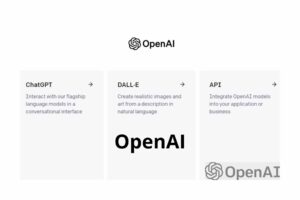
Breakthroughs in Reinforcement Learning
Reinforcement learning, a branch of AI focused on training agents to make sequential decisions, has seen remarkable advancements through OpenAI’s research. This incredible AI company has achieved groundbreaking game-playing, robotics, and optimization results by leveraging techniques such as deep Q-networks and policy gradients.
Advancements in Computer Vision and Image Recognition
Computer vision, an AI field that enables machines to interpret visual data, has witnessed significant progress due to OpenAI’s contributions. The company has improved object detection, image classification, and image generation capabilities through deep learning models and large-scale datasets.
Innovations in Natural Language Generation and Understanding
OpenAI has pioneered natural language generation models that can generate human-like text based on given prompts. These models, such as GPT-4, have demonstrated exceptional language understanding and have been applied in tasks like content creation, language translation, and virtual assistance.
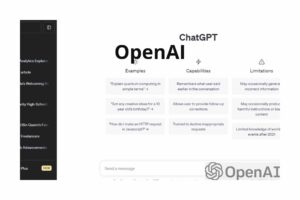
Ethical Considerations in OpenAI’s Research and Development
As AI technologies advance, this platform acknowledges the importance of ethical considerations. It actively explores fairness, transparency, and accountability in AI systems. OpenAI strives to mitigate biases, protect user privacy, and ensure that AI technologies are developed in alignment with societal values.
Applications of OpenAI Technology
Following are some of the applications this AI company has been working on recently.
Robotics and Automation
OpenAI’s advancements in AI have paved the way for transformative applications in robotics and automation. From autonomous vehicles to industrial automation, this company’s research and technologies drive various industries’ efficiency, safety, and productivity.
Virtual Assistants and Chatbots
Virtual assistants and chatbots powered by OpenAI’s language models are revolutionizing customer service, information retrieval, and personal assistance. These AI-powered agents can understand and respond to natural language queries, providing users instant access to information and support.
Speech Recognition and Natural Language Interfaces
OpenAI’s research in speech recognition has enabled significant improvements in voice-based interfaces. From voice assistants in smartphones to transcription services, OpenAI’s technology allows users to interact with devices and systems using natural language commands.
Predictive Analytics and Data Science
OpenAI’s AI algorithms and models are transforming predictive analytics and data science. By leveraging the power of machine learning, businesses can gain valuable insights from large datasets, enabling informed decision-making and unlocking new opportunities.
Ethical Considerations in OpenAI Development
This AI platform is critical regarding the ethics and the social policy they adopt.
Ensuring Transparency and Accountability
OpenAI recognizes the importance of transparency and accountability in AI development. By providing explanations for AI decisions and making the decision-making process more interpretable, the platform aims to build trust and alleviate concerns surrounding AI’s black-box nature.
Addressing Bias and Fairness in AI Systems
OpenAI is committed to addressing bias and promoting fairness in AI systems. It emphasizes the need to mitigate biases in training data, algorithms, and decision-making processes to ensure AI systems are unbiased and treat all individuals fairly.
Safeguarding Privacy and Data Protection
OpenAI recognizes the criticality of privacy and data protection in the AI landscape. It adheres to rigorous security practices to safeguard user data and comply with privacy regulations. OpenAI prioritizes user privacy and aims to build AI systems that respect individual data rights.
Navigating the Social and Economic Implications of AI
As AI advances, OpenAI acknowledges AI technologies’ potential social and economic impact. It actively engages in discussions and collaborations to address the challenges associated with AI adoption, job displacement, and socioeconomic inequality.
OpenAI’s Impact on Society and Industries
The AI company is hopeful it will positively impact businesses of all sizes and society.
Transforming Healthcare with AI Innovations
OpenAI’s AI innovations in the healthcare sector are transforming diagnostics, personalized medicine, and patient care. AI-powered systems can analyze medical images, detect anomalies, and assist in disease diagnosis, leading to improved accuracy and faster treatment.
Revolutionizing Transportation and Autonomous Vehicles
OpenAI’s contributions to autonomous driving and transportation systems are reshaping the future of mobility. AI algorithms enable self-driving cars to perceive their surroundings, make real-time decisions, and navigate complex environments, potentially enhancing safety and efficiency on the roads.
AI in Finance and Business Operations
In finance and business operations, OpenAI’s AI technologies streamline processes, automate tasks, and enable data-driven decision-making. AI-powered algorithms can analyze market trends, detect fraud, and optimize business operations, improving efficiency and profitability.
Education and AI: Shaping the Future of Learning
OpenAI’s AI technologies have the potential to revolutionize education and learning. Personalized tutoring systems, adaptive learning platforms, and intelligent educational tools can enhance the learning experience, cater to individual needs, and make education more accessible.
Conclusion
OpenAI’s relentless pursuit of advancing AI technologies has propelled the world into an era of artificial intelligence. Through groundbreaking research, collaborations, and ethical considerations, OpenAI is shaping the future of AI while striving to ensure its responsible and beneficial use. As AI continues to evolve, OpenAI remains at the forefront, embracing the opportunities and challenges that lie ahead, with a vision to create a world where artificial intelligence serves humanity’s best interests.
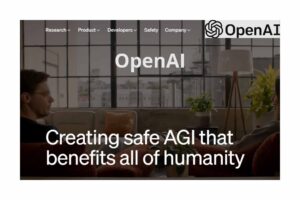
Bio
Qasim Bajwa, a talented writer, combines his expertise in computer science with his creative flair to produce captivating content. Over the past five years, he has honed his skills as a writer, with two years of general writing experience and four months specializing in web content creation. His diverse skill set allows him to excel in various writing domains.
